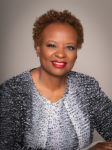Positive mental health corner
The
with Dr. Elisa P Bell
I have never known peace in American society
June 2, 2020
As a physician and psychiatrist, I have overcome many barriers to pursue my calling as a healer. Still as a Black American, I cannot overcome—for myself and for others—the systemic biases embedded in our society.
Right now, these widely accepted inequities inspire peaceful protests and ignite opportunities for destruction. Right now, the later diverts our attention from the true message of our fellow-citizens standing up for equal access and equal rights, for being regarded as equally human.
For me, it does not matter if I am educated, financially secure, physically, mentally, emotionally and spiritually healthy. I still am bombarded by threats and messages from mainstream Americans. Every single day, they tell me I am not good enough, not smart enough, not pretty enough and not rich enough.
For my Black community—and all marginalized communities—there is no peace of mind or spirit. Our struggles only are amplified when one of us comes to a violent end. George Floyd’s brutal murder breaks our hearts. The death of Ahmaud Arbery, the harassment of Christian Cooper and the disproportionate impact of COVID-19 on communities of color all build to a devastating crescendo.
Every single day, people of color carry the weight of systemic racism. Against our will, we arrived as chattel property on the shores of this country. Since January 1, 1863, we still endure injustice, mental anguish and inhumane treatment. We still have not achieved the promise of liberation from freedoms stolen more than 400 years ago.
Each day as people of color, we are challenged to resist racial onslaughts. We are pressured to rise above the hatred and ridicule. We are expected to work as a member of a society that cheats, disregards, discriminates, disrespects, verbally abuses and even kills people of color like me.
Ubiquitous racism, no matter how subtle, effects our physical wellness as well as mental, emotional and spiritual well-being. Inequalities—without access to healthcare, to education and to a safe neighborhood and home—reduce our life expectancy when compared with the national average.
As a psychiatrist, my job is to help people who feel hopeless, angry, sad and exhausted. I ask myself—How do we survive such upheaval? How can I help others do so? How can we consider the work before us when our spirits are decimated?
We need systemic change. We can only be victorious if we work side-by-side.
But first, take a moment to breathe deeply. Care for your own mental health. Arm yourself to face adversity and to fight for change. Only when you know how to care for yourself will you be empowered to care for your loved ones.
Here are my suggestions to achieve your own peace so you are ready to act for the common good of people of color.
- Seek help from a higher being—God, Allah, Jehovah, Buddha, Mohammed, Jesus—to see us through these dark times.
- Take a moment to breathe and remember the pleasures that color your life, the people and moments that bring joy to you.
- Look inside your deepest self and reflect on your strengths. Call on them as you remind yourself of your own value and glorious humanity.
- Remember we are created to love one another. We should aspire to be one in this fight. We need one another to survive in this space and time.
My specialized work in cultural competency gives people tools to become aware of who we are—the influence of our biases, our actions and our privileges. Together, we can create a future—liberated from centuries of disparity. Achieving such a dream discussed—while seated at supper tables or standing before monuments proclaiming freedom—consume people of all colors and cultural backgrounds.
The time is now. We must actively change how we think, how we govern, how we treat one another. As a majority, our goal is to value humanity, to open our hearts, to explore opinions and cultures different from our own. While I work to educate, I fight to change the social and political constructs dividing us.
Until we conquer and eliminate racism, true peace eludes all of us. Consider starting your journey toward peace by looking inward. Begin your journey today. Take a first step. Then, another.
I see Americans coming together to fight with virtue for peace, for equality, for the ability to live with dignity. In our hearts as Americans, all of us want peace. But true peace cannot coexist when any one member suffers.
During these crucial days, a new order can be born. I have hope for the future fashioned by clear-eyed resilience and persistence. Cleave to peace. Open your mind and heart. Focus on being the instrument of change for the better.

Understanding culture is vital for healthcare professionals and their patients. In her book, Are You Culturally Competent? Elisa P. Bell, M.D. bridges cultural gaps to improve healthcare outcomes.
By Elisa P. Bell, M.D., Board certified physician in both adult and child/adolescent psychiatry
Be the first to comment